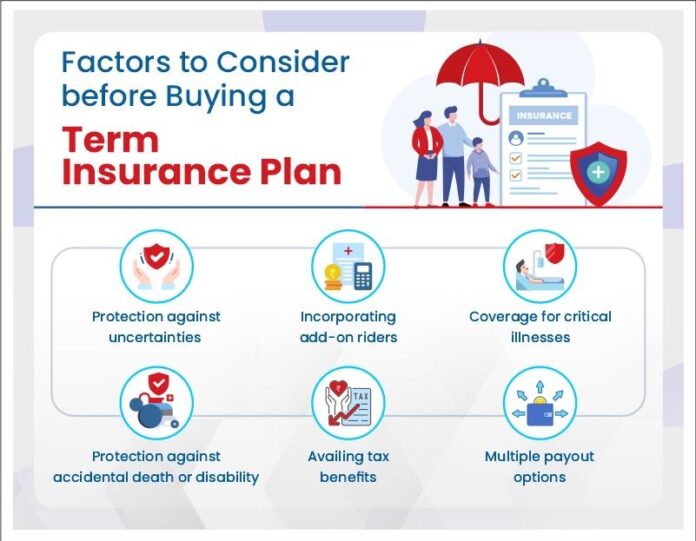Financial security is a way of life, particularly while providing for the well-being of your family. There is always uncertainty, but you can provide for the well-being of your family’s future using the right money tools. Term insurance policy is one such inevitable tool. What is term insurance, and why do we need it? Let us explain it in simple words.
What Is Term Insurance
Term insurance plan is a life cover that provides financial protection for a term, which is referred to as the policy term. In case the policyholder dies within the term, the insurer pays the nominee the lump sum amount. If the policyholder survives beyond the term, then no payment is given.
Unlike investment-oriented life insurance policies, term insurance is more of a protection policy. It will see to it that your family will not have to suffer financial losses following your death.
How Does Term Insurance Work?
A term insurance policy is simple and easy to understand:
- Select a Coverage Amount: The assured amount should be big enough to meet your family’s future needs.
- Select from Policy Terms: You select a term for which the policy will be in force, i.e., 30, 20, or 10 years.
- Pay Premiums: The company pays regular premiums, i.e., yearly, quarterly, or monthly.
- Claim Process: If the person becomes insured and passes away before the end of the policy term, the nominee receives the amount assured.
Most Important Benefits of Term Insurance
- Lower Costs: Term life insurance gives the highest coverage at a lower premium compared to other life insurance policies.
- Financial Security for Your Family: The lump sum amount can be used to pay for routine bills, education expenses, outstanding loans, and financial dues.
- Multiple Policy Plans: You can choose different coverage and terms according to your financial responsibilities.
- Additional Riders for Extra Benefits: Riders like accidental death cover, critical illness cover, and disability cover add another layer of cover.
- Tax Advantage: Premiums paid towards term insurance are allowed to be claimed under Section 80C and the death benefit is tax-exempt under Section 10(10D) of the Income Tax Act.
Who Can Buy a Term Insurance Plan?
A term insurance policy is useful to all, young or old, and all professions. The reasons why various individuals should possess it are:
- Young Professionals: Early start guarantees low premiums and long-term financial security.
- Married People: Ensures spouse and child with financial security in the event of an untimely demise.
- Parents: Ensures coverage for children’s education, medical bills, and future requirements.
- Entrepreneurs: Can be used as a financial buffer for business loans and obligations.
Different Term Insurance Plans
- Conventional Term Plan: Provides a lump sum amount in case of the policyholder’s death.
- Increasing Term Plan: Grows with age to match inflation.
- Decreasing Term Plan: Suitable for loan recipients since the assured amount reduces over time.
- Return of Premium Plan: Returns all paid premiums if the policyholder survives the term.
- Convertible Term Plan: Can be converted into any other life insurance plan.
How to Select the Best Term Insurance Policy?
While selecting the best term insurance policy, keep the following points in mind:
- Coverage Amount: It should be at least 10-15 times your income per annum.
- Policy Term: The tenure should be for your working years in terms of money.
- Premium Affordability: The premium should be within your means.
- Insurer’s Reputation: Check the claim settlement ratio to be assured of reliability.
- Add-On Benefits: Ride with riders such as accidental death or critical illness cover.
Misconceptions About Term Insurance
- Term Insurance Is Too Costly
Reality: It is one of the most affordable insurance policies.
- Marital Couples Alone Require Term Insurance
Reality: Single with dependents or without, you must have it.
- Group Insurance Offered By The Employer Is Sufficient
Reality: Group insurance offered by employers is not enough and depreciates when you switch jobs.
- Homemakers Do Not Require Insurance
Fact: Homemakers do as much work and would cause financial difficulties if they weren’t around.
Frequently Asked Questions (FAQs)
- What happens if I miss a Premium Payment?
There is generally a 30-day grace period provided by most insurers. The policy becomes null and void if payment isn’t made within this time frame.
- Am I Covered under Term Insurance If I Have Health Problems?
Yes, but it could be more depending on how bad your health issue is.
- How Much Term Life Insurance Coverage Should I Have?
10-15 times your salary is the minimum to keep your money safe.
- Is Term Insurance Better Than Whole Life Insurance?
Term insurance is best for simple protection, whereas whole life insurance comes with an investment component.
- Can I Buy Additional Term Life Insurance Coverage Later?
Some plans offer to enhance the sum assured at significant life events like childbirth or marriage.
Conclusion
A term insurance policy is an easy monetary security shield that offers protection, affordability, and serenity. Knowing the term insurance meaning and selecting the ideal policy ensures your loved ones financially even after your death. Do not delay—buy term insurance today and create a secured future for your loved ones!
Also Read: Securing Child’s Future with the Best Life Insurance Plans






